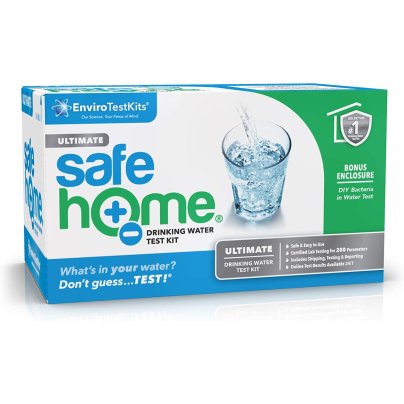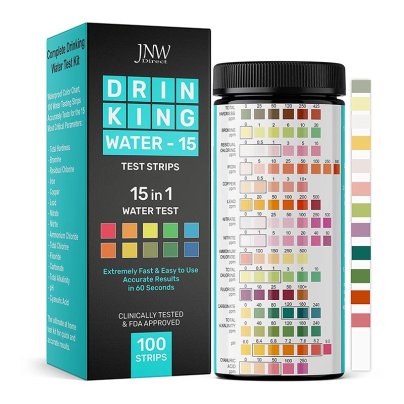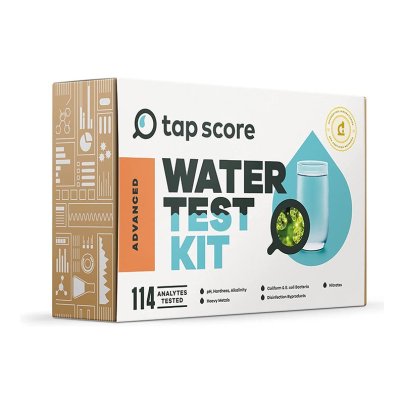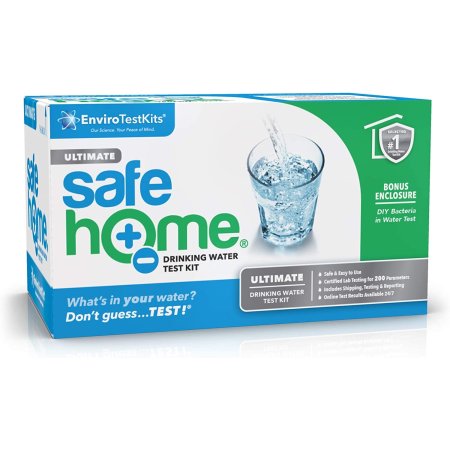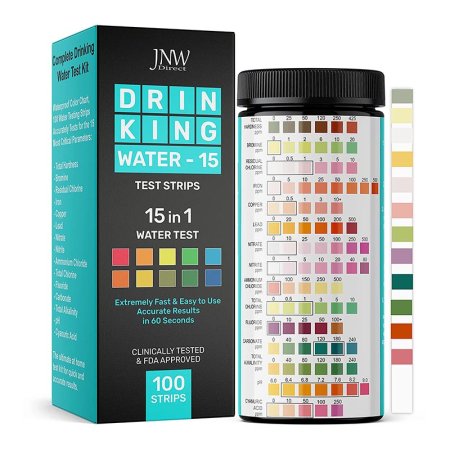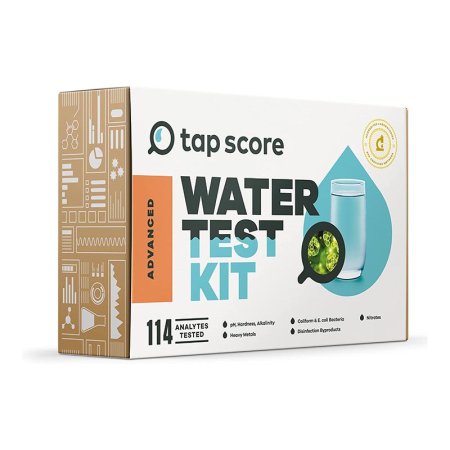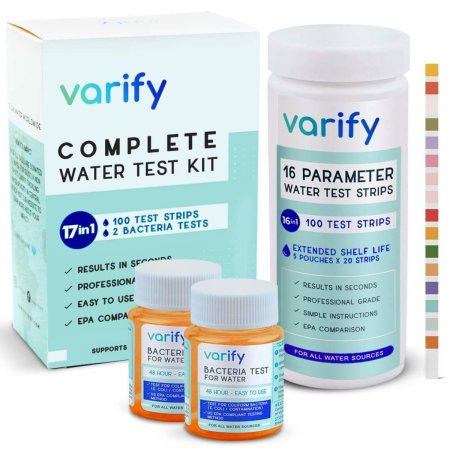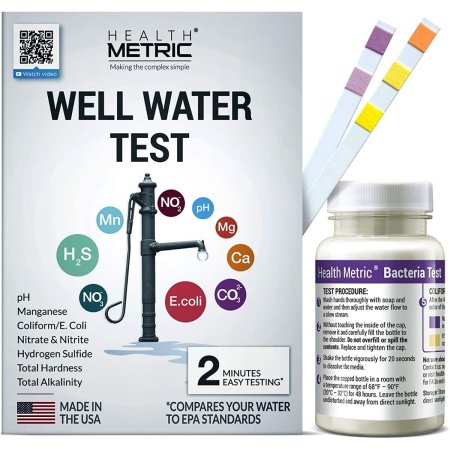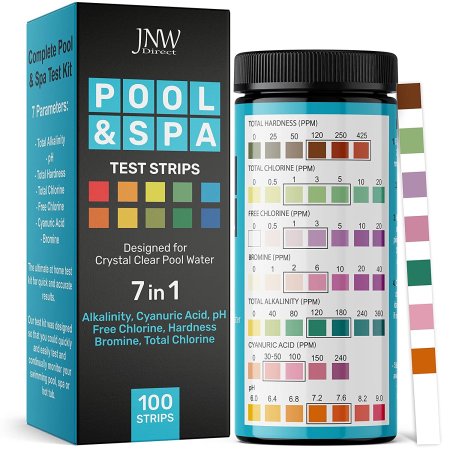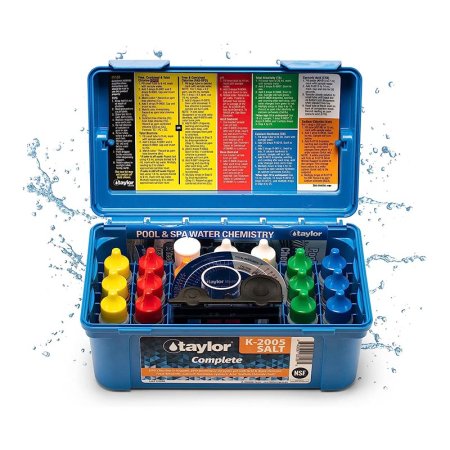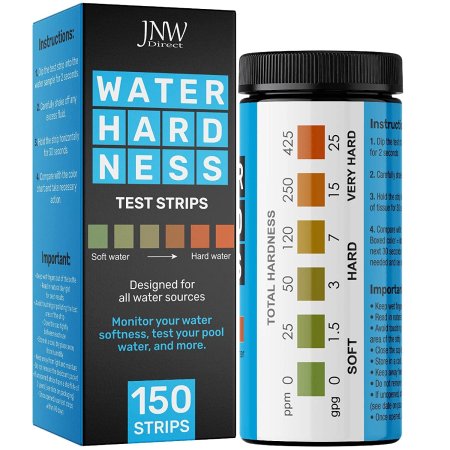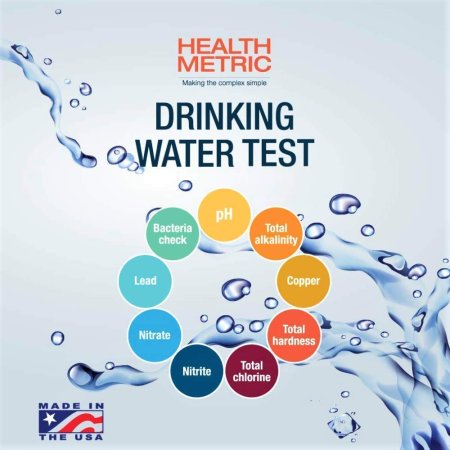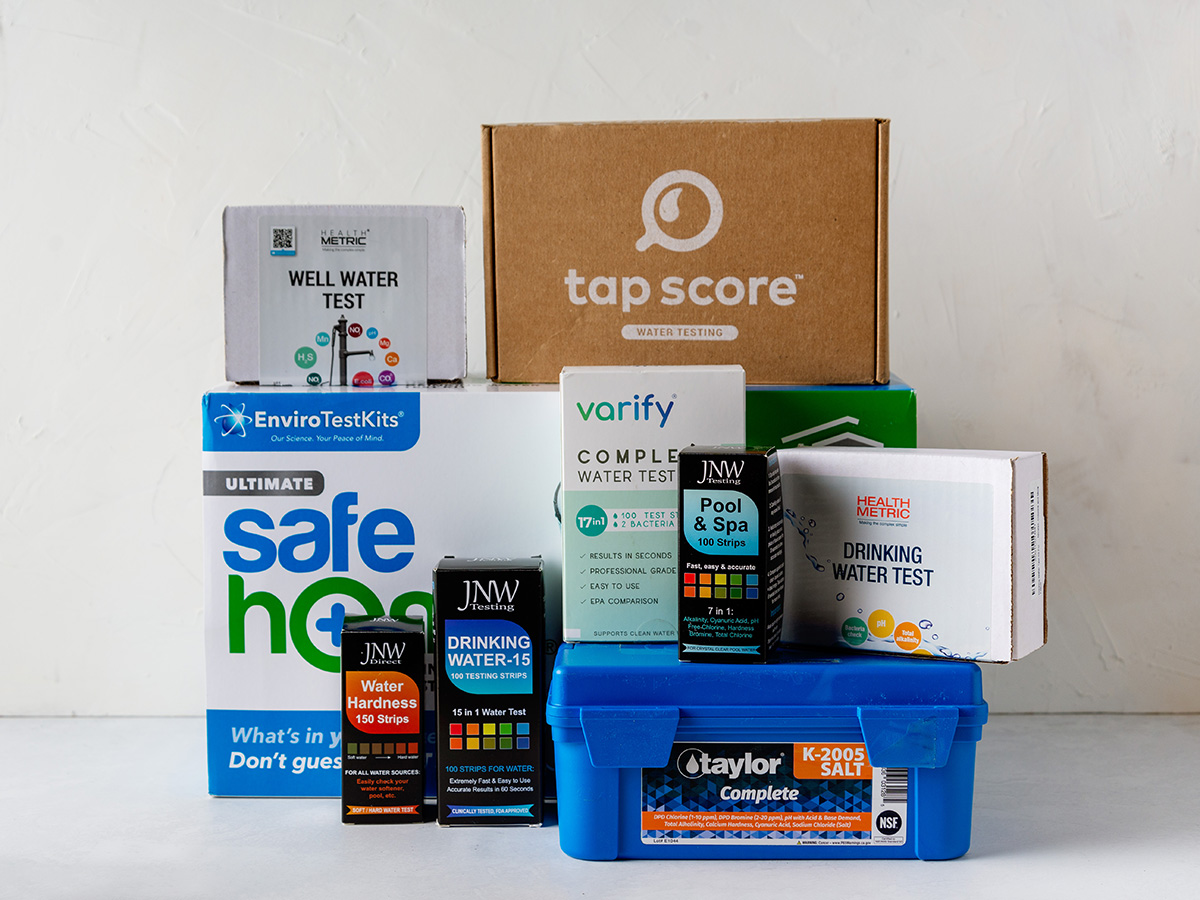
We may earn revenue from the products available on this page and participate in affiliate programs. Learn More ›
Certain volatile organic compounds (VOCs) in water can wreak havoc on your health and home appliances if they aren’t detected and eliminated. That’s why we researched more than 30 home water test kits, narrowed our options down, and tested each one.
Choosing the best option depends on the water source and the contaminants that may be present, so our list includes products with a variety of features and best uses. Continue reading to find out how we chose and tested them, the test results, and which one might be the best water test kit for your situation.
- BEST OVERALL: Safe Home Ultimate Drinking Water Test Kit
- BEST BANG FOR THE BUCK: JNW Direct Drinking Water Test Kit
- BEST FOR HOME: Tap Score Advanced Water Test Kit
- BEST FOR DRINKING WATER: Varify Complete Drinking Water Test Kit
- BEST FOR WELL WATER: Health Metric 8-in-1 Well Water Test Kit
- BEST FOR POOL WATER: JNW Direct Pool and Spa Test Strips
- BEST FOR SALTWATER POOLS: Taylor K-2005-SALT Complete Water Test Kit
- BEST FOR WATER HARDNESS: JNW Direct Water Hardness Test Strips
- ALSO CONSIDER: Health Metric Tap and Well Drinking Water Test Kit
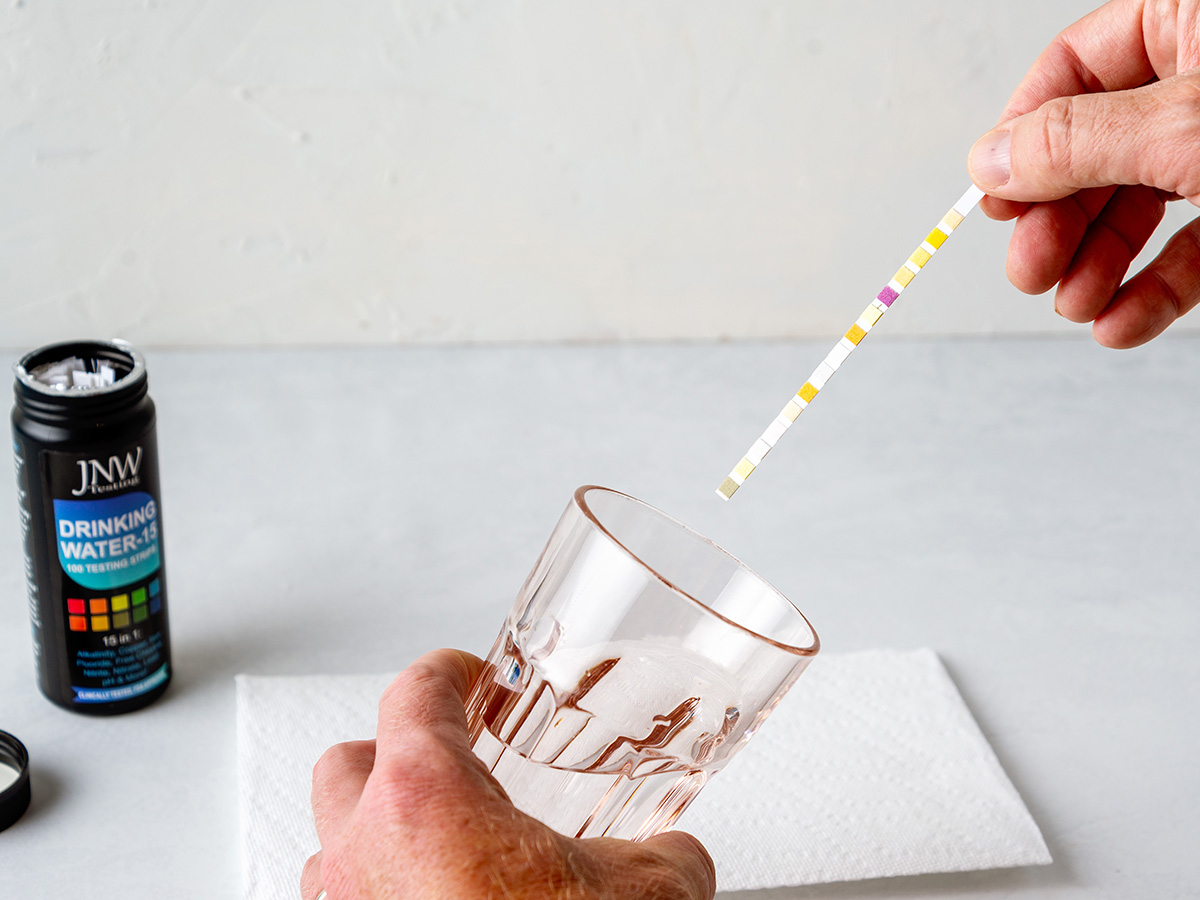
How We Tested the Best Water Test Kits
Ensuring that tap, well, pool, and spa water is clean and uncontaminated is easy with the right testing kit. The best water testing kit choices depend on the testing type, water source compatibility, the number of tests included per kit, how many and which types of contaminants can be detected, and how quickly results are processed. The kits we tested included fast-acting DIY test strips and sampling kits for lab testing.
All of the kits in this guide delivered matching results, either numerical values within a 3 percent margin of error or a color code range corresponding to numerical lab test results. For the lab kits, we simply sealed our water samples in containers and shipped them out for professional analysis. The results were available within 3 weeks. We compared the results from those tests to one another and used them as benchmarks to gauge the accuracy of our DIY test kits.
Most of the water testing kits we tested use color-coded strips to detect contaminants. We dipped the strip into our water sample and waited a few seconds for the reaction to occur. Then we compared the color squares on the strip with the corresponding test keys to find out how much lead, fluoride, iron, copper, mercury, chlorine, nitrite, nitrate, pH, total alkalinity, hardness, aluminum, sulfate, zinc, manganese, or bacteria might be in the water.
Our Top Picks
If you’re searching for a reliable water test kit, we can help. We tested some of the best water test kits across a variety of categories. To help you make an informed choice, we’re sharing the testing parameters and best-use scenarios for each product and detailing our experience working with them.
Best Overall
Safe Home Ultimate Drinking Water Test Kit
Pros
- Tested in an EPA-certified laboratory for accuracy; only takes 7 to 10 business days for results
- Comprehensive testing for more than 200 water-quality parameters
- Purchase gives users access to 200 pages of water management tips and contaminants to avoid
Cons
- Some users may find technical language in the results a little hard to follow
- Most expensive option on this list (though it was also the most detailed)
Anyone in need of a detailed drinking water analysis with the broadest range of testing parameters will want to consider the Safe Home Ultimate drinking water test kit. You send in the samples, and professional lab technicians do the rest.
A lab certified by the Environmental Protection Agency (EPA) tests Safe Home water samples for 200 water-quality parameters, including 12 physical properties, seven types of inorganics, 31 metals, 20 pesticides and herbicides, 78 volatile organics, five trihalomethanes (or TTHMs), and 47 volatile tentatively identified compounds (or TICs). The lab testing fee is included with purchase, and results are available within 7 to 10 business days. The company’s e-learning center covers over 200 pages worth of tips for keeping water clean and identifying any contaminants that may be polluting water.
This test kit was bulky and expensive but very easy to use and provided incredibly detailed information. We simply filled the enclosed vials with our samples, sealed the box, and shipped it to the lab. We accessed our digitally available results in just under 2 weeks and received a hard copy about a week later. The results themselves were highly detailed and included links to help us learn more about specific contaminants. There was a bit of technical language to navigate, but the links and customer support were helpful.
Read our full review: Safe Home Ultimate Drinking Water Test KitProduct Specs
- Type: Vials/lab testing
- Parameters tested: 12 physical properties including alkalinity, hardness, pH, and 188 contaminants including inorganics, organics, metals, pesticides, herbicides, TTHMs, and TICs
- Compatible water type: All water sources
Get the Safe Home water test kit at Amazon or Safe Home.
Best Bang For The Buck
JNW Direct Drinking Water Test Kit
Pros
- Tests for 15 contaminants and properties, including nitrate, nitrite, iron, copper, lead, fluoride, cyanuric acid, pH, and alkalinity
- Easy to use; testing instructions clearly labeled on the bottle
- Mobile app as well as an e-book included for added user-friendliness
- Results available within minutes of testing
Cons
- Bacteria test not included with this kit; must be purchased separately
- Test strips must be used carefully to avoid “color bleeding” or inaccurate readings
For a basic water test kit that doesn’t break the bank, look no further than JNW Direct’s drinking water test kit. It comes with 100 test strips that check for 15 parameters: iron, copper, lead, fluoride, pH, cyanuric acid, total alkalinity, residual chlorine, total chlorine, bromine, ammonium chloride, total hardness, carbonate, nitrate, and nitrite. The ideal EPA standards for each parameter are marked directly on the bottle for quick and easy reference.
JNW Direct also offers a mobile app to track and monitor the results of water tests and includes an e-book that provides ideas about how to improve the quality of drinking water. The main drawback is this kit doesn’t directly test for bacteria; however, it does test for nitrates and nitrites, which are clues to a bacterial presence.
The JNW Direct test strips were inexpensive, easy to use, and gave us a quick, clear indication of the various contaminant levels. Although the color-coded strip offers less detail than a lab test, we found that it closely aligned with the lab test results. Like other chemical test strips, the colors are susceptible to running if handled improperly, so a little practice may be in order.
Product Specs
- Type: Testing strips
- Parameters tested: Alkalinity, pH, hardness, bromine, residual chlorine, total chlorine, iron, copper, lead, ammonium chloride, fluoride, carbonate, cyanuric acid, nitrate, and nitrite
- Compatible water type: Municipal water and well water
Get the JNW Direct drinking water test kit at Amazon or Walmart.
Best for Home
Tap Score Advanced Water Test Kit
Pros
- Includes 3 vials, easy-to-follow sampling instructions, and a prepaid shipping label to submit samples
- Professional lab testing for 114 parameters that affect water aesthetics, human health, and plumbing
- Unique Tap Score algorithm generates a standardized water quality score that helps users better understand the test results
- Includes detailed information for listed contaminants to help you understand how they affect health and plumbing
- Includes recommendations to improve your home water quality
Cons
- Slower and more expensive than test strips; not ideal for frequent monitoring
The Tap Score Advanced water test kit is ideal for analyzing all kinds of drinking water, whether it’s from a municipal water utility or a private well. It’s especially useful near agricultural or industrial activity, where customers may be concerned about bacterial, pesticide, or heavy metal contaminants.
The kit includes three vials with easy instructions for sampling directly from the faucet and a prepaid shipping label to submit the samples for testing. Tap Score’s EPA-certified lab checks 114 water-quality parameters and posts the results to your account about 2 weeks after shipping, or 10 days after the lab receives the samples. The results come with a personal “tap score” calculated by the company’s algorithm based on your water’s aesthetics, its impact on your health, and its impact on your plumbing.
The Tap Score Advanced water test kit gave us thorough results at a discount compared to the Safe Home lab test and did a great job of explaining the contaminants. The testing regimen was less detailed than Safe Home’s, but the interpretation of the results was outstanding. We really liked the idea of a standardized water-quality score and the ability to drill down on specific contaminants and learn how they might affect our health or plumbing system.
Product Specs
- Type: Vials/lab test
- Parameters tested: Alkalinity, conductivity, total dissolved solids, turbidity, pH, metals, bacteria, inorganics, nitrite, nitrate, THMs, VOCs, disinfection byproducts, and petrochemicals
- Compatible water type: Municipal water and well water
Get the Tap Score water test kit at Amazon or Tap Score.
Best For Drinking Water
Varify Complete Drinking Water Test Kit
Pros
- Tests for major contaminants including lead, bacteria, and mercury, among others
- Comes with 100 testing strips for frequent testing and reliability
- Most test results available in minutes (except for bacteria, which takes around 48 hours)
Cons
- Bacteria results take 48 hours; may take too long for some users’ preferences
Varify’s drinking water test kit tests for 17 parameters, including lead, fluoride, iron, copper, mercury, chlorine, nitrite, nitrate, pH, total alkalinity, hardness, aluminum, sulfate, zinc, and manganese, in addition to bacteria.
The kit includes 100 test strips that each test for the first 16 water-quality parameters, plus two tests that check for the presence of bacteria. Both the test strips and the bacteria tests are created in compliance with EPA testing standards. The test strips are ready to analyze in 15 minutes, and the bacteria tests are ready to read in 48 hours.
Many test strips become messy with color runs that make them difficult to read or colors that continue to change after the allotted test time, which can corrupt the results. Those issues were significantly improved in the Varify Complete water test kit. Although the color results took longer to develop than others we tested, they remained stable and didn’t really run. In terms of handling and reliability, these were our favorite test strips to use.
Product Specs
- Type: Testing strips
- Parameters tested: Alkalinity, pH, hardness, bacteria, free chlorine, total chlorine, copper, fluoride, iron, lead, manganese, mercury, nitrite, nitrate, sodium chloride, sulfate, and zinc
- Compatible water type: All water sources
Get the Varify water test kit at Amazon, Varify, or Walmart.
Best for Well Water
Health Metric 8-in-1 Well Water Test Kit
Pros
- Tests 8 parameters of concern in well water including nitrate/nitrite, hydrogen sulfide, water hardness, and coliform bacteria
- Fast and easy well-water testing; results process in around 10 minutes
- Directions are included with purchase for added convenience and user-friendliness
- Follows EPA standards and guidelines for well-water testing
Cons
- Does not test for agricultural or industrial contaminants; additional testing may be necessary in some locations
This well-water test kit from Health Metric is specifically formulated for well water’s unique risks. Well water is not regulated under the Safe Drinking Water Act. In addition to testing for the standard parameters of nitrate, nitrite, water hardness, pH, and total alkalinity, this kit tests for manganese, hydrogen sulfide, and coliform bacteria. The tests are developed in accordance with EPA standards, and the results for most of the parameters are available within minutes.
Well users need not worry about certain city water issues. We liked the simplified design of these test strips, eliminating the spots for chlorine, cyanuric acid, and other elements not found in wells. These well-water testing strips reacted in just a few minutes, and the colors held fairly stable. Fewer test squares made the strips easier to read quickly. Although there are no tests included for agricultural or industrial contaminants, this is a good kit for monitoring a healthy well.
Product Specs
- Type: Testing strips
- Parameters tested: Coliform bacteria, nitrate, nitrite, manganese, hydrogen sulfide, water hardness, pH, and total alkalinity
- Compatible water type: Well water
Get the Health Metric 8-in-1 water test kit at Amazon or Health Metric.
Best for Pool Water
JNW Direct Pool and Spa Test Strips
Pros
- Checks for 7 different types of water conditions and contaminants, including hardness and alkalinity
- Easy to use with results available seconds after test strip is dipped in water
- Includes 100 test strips, a color-coded chart to interpret results, and an e-book
Cons
- Test strips exhibited some color runs that could confuse the results
- The color was less stable after a couple of minutes, so quick reading was required
Pools and spas have unique water-quality requirements that differ from drinking water, so specialized tests are necessary. These test strips from JNW Direct have seven-in-one testing capabilities that are great for anyone looking to keep their pool or hot tub water clean and safe. They test total chlorine, hardness, bromine, free chlorine, pH, cyanuric acid, and alkalinity.
Testing is really easy. All you need to do is dip a test strip into the water. Color-coded results are available in seconds and can be checked against the handy color-coded chart that’s included. For added convenience, one purchase comes with 100 strips and a convenient e-book with tips for keeping a hot tub and pool clean.
Although these strips are not equipped for use with saltwater pools, they worked well in our conventional chlorine pool. Testing only took 30 seconds, and the results were consistent with lab tests. New users may need a little practice to get the hang of it, as the color continues to develop after the testing window, making fast reading ability a priority. We snapped a photo with the test strip alongside the color chart to give ourselves a little extra time with precise colors and no runs.
Product Specs
- Type: Testing strips
- Parameters tested: Hardness, total chlorine, bromine, free chlorine, pH, cyanuric acid, and alkalinity
- Compatible water type: Pool and hot tub water
Get the JNW Direct pool and spa water test kit at Amazon.
Best for Saltwater Pools
Taylor K-2005-SALT Complete Water Test Kit
Pros
- Complete test kit for monitoring and maintaining safe and healthy saltwater pools
- Helps you make informed decisions about pool maintenance chemicals
- Heavy-duty case for chemical reagents keeps bottles secure in individual compartments
Cons
- Slower overall than test strips because it requires individual testing for each parameter
Saltwater pools have special testing requirements for salt levels but share most water-quality standards with chlorine pools. Other saltwater pool test kits only provide reagents for measuring salt levels, ignoring the rest of the pool chemistry. This Taylor K-2005-SALT liquid test kit offers all of the testing materials needed to monitor the whole chemical balance of the pool water.
The kit includes reagents for analyzing salinity, pH, chlorine, bromine, acid demand, base demand, total alkalinity, calcium hardness, and cyanuric acid. It is neatly packed in a heavy-duty plastic case for secure storage. Also included is an easy-to-use water-balance calculator for quick chemical level reference.
Although working with the liquid reagents required a bit more care and precision than simply dipping a test strip, we really appreciated getting immediate, accurate results from the Taylor K-2005-SALT kit. The reagent bottles were color-coded for easy identification and held securely in the carry case along with the test vials and reference materials. We also liked that the kit provides guidance for what and how much must be added to balance the pool chemistry.
Product Specs
- Type: Color disc with liquid reagents
- Parameters tested: Salinity, free chlorine, total chlorine, bromine, pH, alkalinity, hardness, cyanuric acid
- Compatible water type: Designed for saltwater pools; also works in chlorine pools
Get the Taylor water test kit at Amazon, Discount Pool Mart, My Pool Yard, or Taylor Technologies.
Best for Water Hardness
JNW Direct Water Hardness Test Strips
Pros
- Comes with 150 tests; suitable for long-term use with ample quantity provided
- Appropriate for use in most household water sources: water softeners, dishwashers, showers, aquariums, and more
- Provides results in seconds; comes with a color-coded chart to read results
- Comes with an e-book for tips and tricks on keeping water soft
Cons
- Results must be checked against a color chart, leaving some room for error in interpretation
Hard water can lead to limescale build-up in plumbing, dry hair and skin, and a shorter lifespan for water heaters and other appliances. JNW Direct’s water hardness test strips can help you determine how high those water hardness levels are so that something can be done before problems surface.
This kit includes 150 test strips that can detect the hardness of all water sources, including water softeners, dishwashers, showers, aquariums, and more. It provides accurate results seconds after dipping a test strip into the water. It also comes with a color-coded results chart and a convenient e-book full of tips and tricks for keeping water hardness to a minimum.
As with other JNW Direct test strips we tested, these water hardness test strips provided fast, reliable results. They were inexpensive and easy to process, and the results were simple to read. Although the source of the hardness (often either calcium or magnesium) is not given, the total hardness indications from the strips aligned consistently and closely with our lab test results. Wherever hard water may be an issue, these test strips would be a great choice for diagnosis and regular monitoring.
Product Specs
- Type: Testing strips
- Parameters tested: Water hardness
- Compatible water type: Household water sources and aquariums
Get the JNW Direct water hardness test strips at Amazon or Walmart.
Also Consider
Health Metric Tap and Well Drinking Water Test Kit
Pros
- Includes supplies for 2 complete tests for accuracy and reliability
- Aligned with EPA water-quality standards for reliable and accurate testing
- Each test strip tests just 1 to 3 test parameters, making it easier to read the results
Cons
- More parts and more testing time required compared to similar test kits
- Higher cost per test than other test kits
Health Metric’s tap and well drinking water test kit checks nine parameters with strips and solutions developed in accordance with EPA standards for accuracy. The kit actually includes separate tests for the different parameters to maximize the accuracy of each individual test of a water supply. It includes one test each for lead, copper, and coliform bacteria as well as two tests each for total chlorine; nitrate and nitrite; and pH, alkalinity, and hardness (in a three-way test).
In our trial, the best benefit of the Health Metric drinking water test kit was the ease of reading the results. The dip strips only have between one and three color squares, compared to others we tested with as many as 15 parameters per strip, so they are easy to match up against the comparison chart. Although the price per full test is considerably higher than the single strip tests and testing each parameter individually is more time-consuming, we didn’t mind the trade-off for ease of use.
Product Specs
- Type: Testing strips
- Parameters tested: Lead, copper, coliform bacteria, total chlorine, nitrate, nitrite, pH, alkalinity, and hardness
- Compatible water type: Tap water and well water
Get the Health Metric tap and well water test kit at Amazon or Health Metric.
Jump to Our Top Picks
What to Consider When Choosing a Water Test Kit
A water test kit can reveal if you need a water filter, shower filter, or water softener for your home. There are lots of ways to investigate water quality, from highly precise professional lab tests to simple DIY test kits.
Before choosing the best water test kit for your home, it’s important to be aware of the types of water kits available, the contaminants for which they test, and several other factors. Keep the following considerations in mind when searching for the best water-quality test kit for maintaining a healthy water supply.
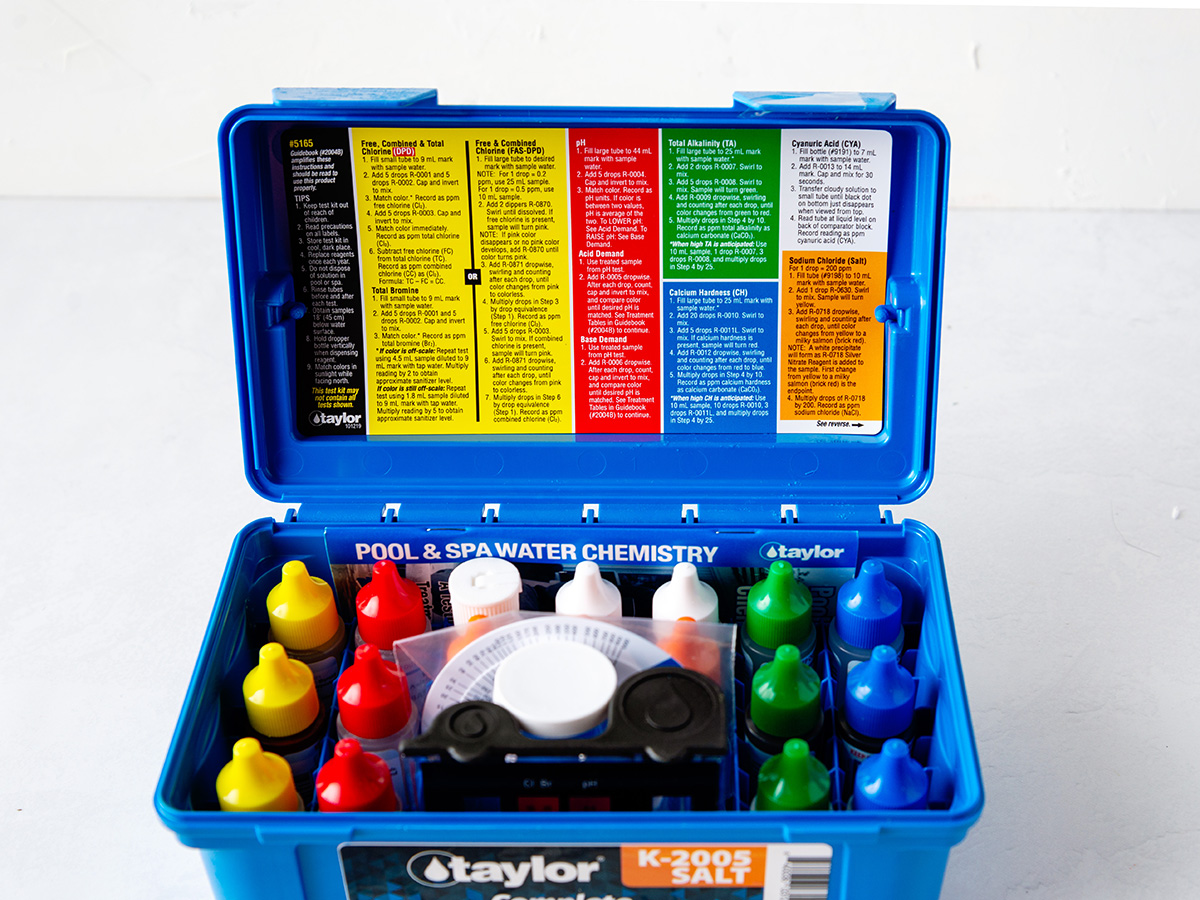
Type
With the exception of lab-tested water test kits, most kits use one of these three means of testing:
- Test strips are small and thin single-use strips that change color to indicate the presence of a contaminant. They can also provide a rough estimate of the concentration of a contaminant by the shade and brightness of the color. A single strip may only test for a single contaminant or may test for several contaminants. Test strips are one of the most common, affordable, and easiest water-testing options.
- Color disc kits are less common and more expensive than test strips, but they’re generally more accurate. They work by introducing a powdered or liquid “reagent” to a water sample to change its color and indicate the presence of a contaminant.
- Digital instruments use a metal electrode to measure the level of raw impurities in a water supply. Most commonly, digital instruments measure TDS and electrical conductivity (EC). TDS refers to inorganic salts (like calcium, magnesium, and potassium) and is measured in parts per million (ppm). EC refers to the amount of dissolved materials that conduct electrical current and is measured in microsiemens per centimeter (µS/cm). Some digital instruments will also measure the water’s pH and temperature. They don’t, however, test for specific compounds or contaminants unless you purchase a device that is specifically calibrated for that purpose, such as a colorimeter for chlorine tests.
Contaminants
The EPA regulates 90 contaminants known to cause biological harm; water test kits can test from one to more than 200 contaminants. The most common contaminants checked for by water test kits include the following:
- Lead: Lead can leach into a household’s water supply through outdated pipes and plumbing fixtures, potentially causing a host of dire health consequences. This is why a lead test is often a key feature in most water test kits. It can cause cardiovascular issues, hypertension, decreased kidney function, brain damage, and reproductive issues.
- Chlorine: Elevated levels of chlorine can cause stomach aches and vomiting, diarrhea, and dry, itchy skin. It can also corrode plumbing pipes, fixtures, and appliances.
- Bacteria: Coliform bacteria (like E. coli) is the most common type of bacteria for which water test kits check. E. coli can cause nausea, vomiting, diarrhea, abdominal cramping, fever, headaches, fatigue, and even death.
- Pesticides: When present in a drinking water supply, pesticides are usually found in trace-level amounts. Although trace levels of pesticides won’t cause acute toxicity, such as nausea, convulsions, and chemical burns, they can cause chronic toxicity from long-term consumption. This can lead to cancer, birth defects, and damage to the central nervous system or liver.
- Nitrates and nitrites: These elements can cause nausea, abdominal cramps, headaches, and increased heart rate.
- Iron: Elevated iron levels can lead to poor skin health, digestive issues, and a condition called hemochromatosis that can damage the heart, liver, and pancreas. However, elevated iron primarily causes plumbing issues, since excess iron leaves a residue that can create clogs in pipes, fixtures, and appliances.
Water Source
Some contaminants are more common in certain water sources than in others. Iron and bacteria, for example, are more common in well water than tap water, while elevated chlorine is more common in tap water than well water. As a result, some test kits are designed to accommodate specific water sources by testing for the most common contaminants found in that source.
The most common examples are test kits specifically for well water, tap water, aquarium water, and spa and pool water. These specialized kits are usually more affordable than those that test for every possible contaminant.
Accuracy
A water quality test kit’s accuracy will vary by manufacturer, but most are calibrated to EPA testing standards to ensure they’re as accurate as possible. Some kits have even been verified for accuracy by EPA-certified laboratories.
A test strip is the least accurate, mostly because matching the colors on the strip to the contaminants indicated can be subjective and prone to user error. However, test strips that test for individual contaminants tend to be more accurate than strips that test for a wide range of VOCs.
Color disc kits are usually more accurate and provide more precise measurements of contaminant concentration but can be prone to the same subjective misinterpretations.
Digital instruments are often calibrated to be accurate down to +/- 2 percent of 1 parts per million and µS/cm, but they don’t measure the presence of specific compounds.
Testing Procedure
Each type of test kit requires a different testing procedure. For test strips, dip the strip into the water you want to test and wait for the color to change. Then, match the color on the strip to the provided color chart that indicates the presence (and relative concentration) of the contaminant. The strip can take anywhere from 1 minute to 48 hours for the color to change depending on the contaminant being tested.
For color discs, the water sample is placed inside a plastic box with a viewing window that displays the water sample next to a “reference color.” To determine the concentration of the contaminant for which you’re testing, compare the reference colors to the water sample. The concentration is usually listed on the reference colors.
Digital instruments just need to have their electrode set into the water being tested, and the TDS and EC will display on the LCD screen in a matter of seconds. With each testing procedure, you can often read the results in minutes, with the exception of a bacteria test, which usually requires a wait time of 48 hours.
FAQs
Still have unanswered questions about water test kits? Find answers to several of the most frequently asked questions about water test kits below.
Q. How do I know if my water is safe to drink?
Using a water test kit can indicate if your water is safe to drink by determining if it has toxic levels of various contaminants.
Q. What should I test my water for?
Well water should be tested once a year for total coliform bacteria, nitrates, total dissolved solids, and pH levels. If you suspect other contaminants, you should test for those as well. However, spend time identifying potential problems first, as these tests can be expensive. Although city water is monitored closely by the municipal water authority, you may wish to test it for impurities coming from supply lines, leaks, or from your home’s plumbing system.
Q. When should I test my water?
Water testing in your home should be done every 2 years. But, you should also test your water if you notice problems such as a change in smell, taste, or color.
Q. Are home water test kits accurate?
The accuracy of home water test kits varies by manufacturer, but many are highly accurate and developed in compliance with federal EPA standards.
Meet the Tester
Mark Wolfe is a writer and product tester with an extensive background in the nursery and landscaping industry. For more than 20 years, he mowed, edged, planted, pruned, cultivated, irrigated, and renovated beautiful landscapes. Now he tests and writes reviews about the latest outdoor power equipment, hand tools, lawn-care products, and other outdoor living goods.
Additional research provided by James Fitzgerald.
